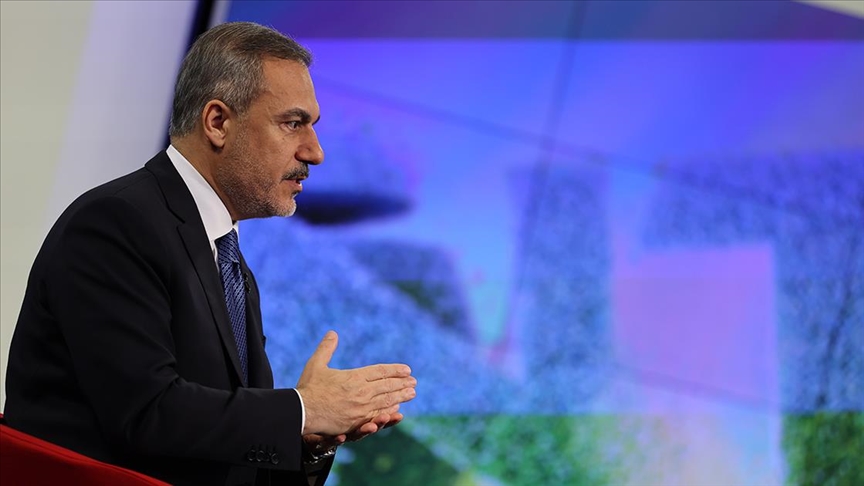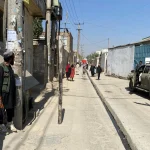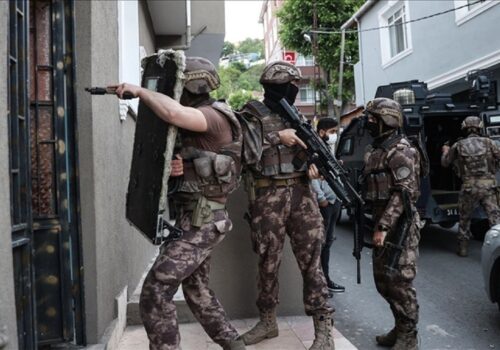Speaking on TV, Turkish Foreign Minister Hakan Fidan talked about Turkey’s current foreign policy. Referring to the Israeli-Palestinian issue as a daily crisis and the issues it affects, Minister Fidan targeted Israel’s policies. Fidan also assessed how Israel-US relations affect Ankara-Washington.
Referring to the point of differentiation by saying that “Washington supports Israel, and we support Palestine unconditionally“, Foreign Minister Fidan said that “there are ongoing issues such as NATO, technology and trade” with the US and explained that “the issues where there are problems with the US and the issues that have continuity should be kept separate from each other“.
Fidan said that although they have different approaches to the Gaza issue with the US, they have common ideas on issues such as securing a ceasefire, the inadequacy of humanitarian aid and the delivery of aid, and that they agree with the US that without a two-state solution, the state of conflict and war will be repeated.
“Support for Israel, which does not recognise any norms and rules, is met with a reaction from the grassroots,” Fidan said, pointing to criticism that the US president’s party is pursuing a policy that contradicts its own values.
"Israel is greedy and aggressive"
In his meetings with his counterparts, Turkish Foreign Minister Fidan said the Palestinian issue should be approached through whether Israel accepts the 1967 borders. “Israel is confronting others because it does not want to be within its own borders, which are recognised by the UN. It is greedy and aggressive,” he said.
Noting that the system of the United Nations’ decision taken by 55 countries in 1946 no longer exists, and that today there are 193 countries, multipolar wars and a competitive environment, Fidan said that a new application is needed.
The Turkish foreign minister said it was very important that South Africa, which overthrew the apartheid regime and set an example for everyone at that time, was the forerunner of the case against Israel at the International Court of Justice, adding that Ankara had taken initiatives in this regard.
Fidan said that during the meeting in Riyadh he realised that his other counterparts had similar thoughts, adding that after his meeting with President Recep Tayyip Erdoğan in Ankara, the decision was taken to get involved in the case. He said that Egypt and Libya had taken similar steps as a result of this breakthrough.
Cairo talks and ceasefire
Stating that Turkey supported the Cairo talks on various issues, especially intelligence, Fidan said that Hamas, Egypt, Qatar and the United States were constantly negotiating and that Israel’s reluctance to make a firm commitment led to a deadlock in the process.
Explaining that Israel was continuing negotiations after Hamas rejected the ceasefire, Hakan Fidan said, “Israel continued negotiations on the one hand and military operations on the other. Hamas’ acceptance of the ceasefire in return for the release of the hostages was a development they did not expect. Israel’s refusal to accept the ceasefire after this decision showed that they did not want a ceasefire in the first place.“
Iraq, the PKK and the development road project
Turkish Foreign Minister Hakan Fidan announced that Turkey has decided to “take the war against the PKK back to where it started” in 2016. Fidan said that Turkey wanted to act with a common understanding with Iraq against the PKK, adding that the organisation was an occupier in Syria and Iraq and that Turkey wanted stability and peace in the region.
Fidan said that there are separate contacts with Erbil, Sulaymaniyah and Baghdad regarding the PKK and that Turkey does not want to be in conflict with its neighbours.
Fidan said the PKK was using the airport and hospitals in Sulaimaniyah and had warned the authorities in the region that they would be targets if they cooperated with the organisation. He expressed hope that the authorities in Sulaymaniyah had understood this, while Turkey was able to carry out precise operations in both the city and the countryside.
The presence of the PKK also has a negative impact on the Iraqi economy, Fidan said, adding that the country is not favourable for foreign investors and international transit. The foreign minister said Turkey had organised its own operations in the absence of a partner for the PKK in Iraq, and drew attention to Prime Minister Shia Sudani’s vision for development.
Stating that Iraq is behind all the projects that will provide services to its own people, Fidan said that Iraq will not be able to use its rich energy reserves as it wishes as long as the PKK is present, and announced that they have offered Baghdad to end the PKK together or by Iraq alone.
Although the Iraqi government is fortifying the points through which ISIS can pass, it is leaving the areas where the PKK is present empty.









